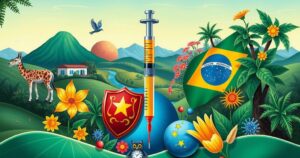Impact of Climate Change on Health: Insights from Liège Conference

The Liège Créative conference examined the One Health approach to address climate change’s effects on health, featuring insights from Dominique Votion and Gilles Darcis. They discussed threats from invasive plants and vector-borne diseases, respectively. The conference highlighted the urgent need for proactive health strategies amid the increasing risks associated with climate change, particularly concerning the *Senecio* genus and mosquito proliferation in temperate regions.
The recent conference organized by Liège Créative, a platform of the University of Liège, focused on the One Health approach addressing climate change’s impact on health. Presenters Dominique Votion, an associate professor of veterinary medicine, and Gilles Darcis, a researcher in infectious diseases, provided distinct insights into how climate change exacerbates health risks for both humans and animals.
Dr. Votion highlighted the influence of invasive plants on health, notably discussing the dangers of the Senecio genus, which can become toxic under climate change conditions. These plants endanger biodiversity, threaten herbivores, and pose significant health risks to humans through contaminated food. Votion emphasized the need for awareness regarding the hepatotoxic alkaloids present in Senecio, which can lead to critical health issues such as liver failure and cancer.
The dangers associated with Senecio exposure require urgent attention, according to Votion. Despite efforts from Belgium’s public health institution, Sciensano, to monitor and manage this threat, the slow onset of symptoms complicates identification and necessitates improved screening methods for food products to prevent long-term health effects.
In contrast, Dr. Darcis explored the complexities surrounding climate change’s impact on vector-borne diseases, such as malaria and dengue. He underscored how myriad factors interplay to influence the evolution of these diseases, making accurate predictions challenging. Darcis pointed out that environmental conditions, particularly droughts, significantly affect mosquito populations, which thrive under specific climatic scenarios that may lead to increased disease transmission.
One critical concern is the possible migration of disease-carrying mosquitoes, such as Anopheles, into higher-altitude areas as temperatures rise. Darcis cautioned that without effective vaccines, the incidence of dengue in Africa may escalate considerably in the coming decades, particularly as climate change enables conditions favorable for the tiger mosquito in temperate regions.
The tiger mosquito’s establishment in Europe, particularly in France and Belgium, poses a rising threat. The spread has already led to local dengue transmission, prompting health monitoring and public awareness initiatives to mitigate exposure. However, Darcis criticized the reactive nature of vector control strategies, arguing for a more holistic focus on climate change’s broader implications for health.
Ultimately, the conference underscored the urgent need to address the multifaceted health threats posed by climate change through the One Health framework. As its impacts pervade diverse ecosystems, interdisciplinary collaboration is essential for mitigating risks to human and animal health.
The discussions at the Liège Créative conference illustrate the tight interconnections between climate change and health. Experts emphasize the rising dangers posed by invasive plants and vector-borne diseases, which are exacerbated by environmental changes. The need for proactive strategies that integrate health considerations with climate policies is vital for safeguarding human and animal wellbeing. Encouraging a comprehensive understanding of these challenges will remain crucial in addressing the impending health crises arising from climate change.
Original Source: www.medscape.com








